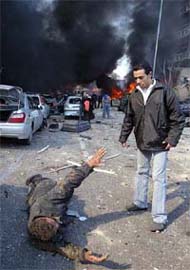 The US Ambassador to the United Nations, Zalmay Khalilzad, is pressing for a vote on the establishment of a special tribunal to investigate the assassination of former Lebanese prime minister, Rafik al-Hariri. The current Lebanese prime minister, Fouad Siniora, formally requested the establishment of the tribunal on May 14. The draft resolution circulated by Britain, France, and the United States, only establishes the UN court; it does not detail operational procedures.
The US Ambassador to the United Nations, Zalmay Khalilzad, is pressing for a vote on the establishment of a special tribunal to investigate the assassination of former Lebanese prime minister, Rafik al-Hariri. The current Lebanese prime minister, Fouad Siniora, formally requested the establishment of the tribunal on May 14. The draft resolution circulated by Britain, France, and the United States, only establishes the UN court; it does not detail operational procedures.
France, the former colonial overseer of Lebanon, also vowed its continued support for the Security Council resolution, and the Lebanese government itself. The new French foreign minister, Bernard Kouchner, was in Beirut on Thursday to pledge further support to the embattled Lebanese government amidst escalating violence there. France has contributed 1,700 troops to the UN peacekeeping force in Lebanon and recently pledged $670 million in aid.
Approval for the tribunal is stalled in the Lebanese parliament, however. Parliament Speaker Nabih Berri has been accused of blocking the tribunal by refusing to convene the national assembly. The speaker is accused by the Lebanese ruling coalition of associating with Syrian interests, who are opposed to tribunal. Lebanese officials have also expressed concern that the establishment of the tribunal will only fuel the already tense conflicts there. The Lebanese army is currently battling militants from Fatah al-Islam, who are based in the Palestinian refugee camp near Tripoli.
UN member states have also expressed reservations over the tribunal. Veto wielding members, Russia and China, have shown reluctance to sign onto the draft resolution, which is expected to come to a vote early next week. Some temporary members have reservations as well, including Panama, South America, and Indonesia. Hesitations are largely centered around fears of aggravating violence in Lebanon. Khalilzad, however, has expressed confidence, stating his awareness of reservations, but observing that failure to establish the special court may result in “further political assassinations, deadlock.”
The current conflict in Lebanon is seen as the countries most violent internal escalation since the countries 25-year civil war, which ended in 1990. Lebanese forces and members of Fatah al-Islam have been battling since a police raid regarding suspected bank robbers from the militant group.
Rafik al-Hariri was assassinated on February 14, 2005 by a large explosion detonated as his motorcade passed the St. George Hotel in the Lebanese capital, Beirut. The explosion killed 22 others.